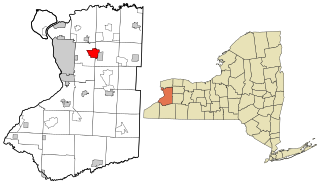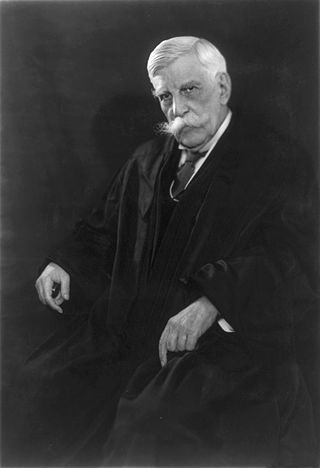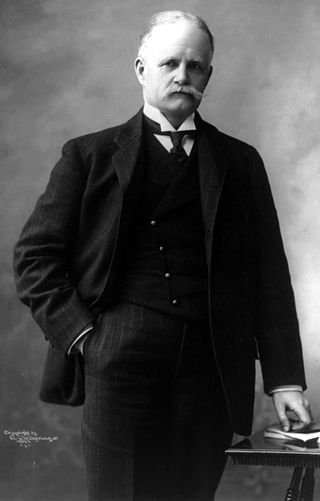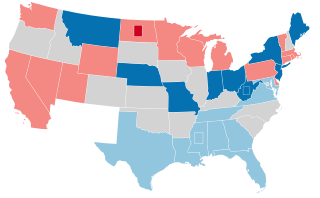
Depew is a village in Erie County, New York. The population was 15,303 at the time of the 2010 census. It is part of the Buffalo–Niagara Falls metropolitan area. The village is named for Chauncey Depew, a politician and one of the original investors who bought the land for the village, which was incorporated in 1894.

Chauncey Mitchell Depew was an American attorney, businessman, and Republican politician. He is best remembered for his two terms as United States Senator from New York and for his work for Cornelius Vanderbilt, as an attorney and as president of the New York Central Railroad System.

George Frisbie Hoar was an American attorney and politician who represented Massachusetts in the United States Senate from 1877 to 1904. He belonged to an extended family that became politically prominent in 18th- and 19th-century New England.

Oliver Wendell Holmes Jr. was an American jurist who served as an associate justice of the U.S. Supreme Court from 1902 to 1932. Holmes is one of the most widely cited Supreme Court justices and among the most influential American judges in history, noted for his long service, pithy opinions—particularly those on civil liberties and American constitutional democracy—and deference to the decisions of elected legislatures. Holmes retired from the court at the age of 90, an unbeaten record for oldest justice on the Supreme Court. He previously served as a Brevet Colonel in the American Civil War, in which he was wounded three times, as an associate justice and chief justice of the Massachusetts Supreme Judicial Court, and as Weld Professor of Law at his alma mater, Harvard Law School. His positions, distinctive personality, and writing style made him a popular figure, especially with American progressives.

Ebenezer Rockwood Hoar was an American politician, lawyer, and jurist from Massachusetts. He served as U.S. Attorney General from 1869 to 1870, and was the first head of the newly created Department of Justice. Hoar assisted President Ulysses S. Grant in appointing two United States Supreme Court justices and was himself nominated to the Court. His nomination was rejected by the United States Senate, in part for his positions on patronage reform. In 1871, Hoar was appointed by Grant to the United States high commission that negotiated the Treaty of Washington between the U.S. and the United Kingdom, helping to settle the Alabama Claims.

Samuel M. Blatchford was an American attorney and judge who served as an Associate Justice of the Supreme Court of the United States from April 3, 1882, until his death in 1893.

Jerome Davis Greene was an American banker and a trustee to several major organizations and trusts including the Brookings Institution and the Rockefeller Foundation.

Rockwood Hoar was a Representative from Massachusetts, the son of Massachusetts US Senator George Frisbie Hoar.

The Albany Academy is an independent college preparatory day school for boys in Albany, New York. It enrolls students from Preschool to Grade 12. It was established in 1813 by a charter signed by Mayor Philip Schuyler Van Rensselaer and the city council of Albany. In July 2007, the once separate Albany Academy and Albany Academy for Girls merged into The Albany Academies. Both schools retain much of their pre-merger tradition and character, and each continues to give diplomas under its own name.

James Aloysius O'Gorman was an American attorney, judge, and politician from New York. A Democrat, he is most notable for his service as a United States Senator from March 31, 1911 to March 3, 1917.

The Supreme Court of Illinois is the state supreme court, the highest court of the judiciary of Illinois. The court's authority is granted in Article VI of the current Illinois Constitution, which provides for seven justices elected from the five appellate judicial districts of the state: three justices from the First District and one from each of the other four districts. Absent mid-term vacancy, each justice is elected for a term of ten years, which may be renewed and the chief justice is elected by the court from its members for a three-year term.

The 1910–11 United States Senate election were held on various dates in various states. As these U.S. Senate elections were prior to the ratification of the Seventeenth Amendment in 1913, senators were primarily chosen by state legislatures. Senators were elected over a wide range of time throughout 1910 and 1911, and a seat may have been filled months late or remained vacant due to legislative deadlock. However, some states had already begun direct elections during this time. Oregon pioneered direct election and experimented with different measures over several years until it succeeded in 1907. Soon after, Nebraska followed suit and laid the foundation for other states to adopt measures reflecting the people's will. By 1912, as many as 29 states elected senators either as nominees of their party's primary or in conjunction with a general election.
The University of Iowa College of Law is the law school of the University of Iowa, located in Iowa City, Iowa. It was founded in 1865.

The 1888 Republican National Convention was a presidential nominating convention held at the Auditorium Building in Chicago, Illinois, on June 19–25, 1888. It resulted in the nomination of former Senator Benjamin Harrison of Indiana for president and Levi P. Morton of New York, a former Representative and Minister to France, for vice president. During the convention, Frederick Douglass was invited to speak and became the first African-American to have his name put forward for a presidential nomination in a major party's roll call vote; he received one vote from Kentucky on the fourth ballot.

Henry Billings Brown was an American jurist who served as an associate justice of the Supreme Court of the United States from 1891 to 1906.
The 1911 United States Senate election in New York was held from January 17 to March 31, 1911, by the New York State Legislature to elect a U.S. Senator to represent the State of New York in the United States Senate.

The 1904–05 United States Senate elections were held on various dates in various states, coinciding with President Theodore Roosevelt's landslide election to a full term and the 1904 House of Representatives elections. As these U.S. Senate elections were prior to the ratification of the Seventeenth Amendment in 1913, senators were chosen by state legislatures. Senators were elected over a wide range of time throughout 1904 and 1905, and a seat may have been filled months late or remained vacant due to legislative deadlock. In these elections, terms were up for the senators in Class 1.
National University School of Law was an American law school founded in Washington, D.C. in 1869. Originally intended as part of a larger design for a national university in the United States, the school was the principal component of National University during its existence. The school existed until 1954, when it merged with George Washington University Law School.

The George Frisbie Hoar statue is a public monument in Worcester, Massachusetts, United States. Located on the north side of the Worcester City Hall, the monument honors George Frisbie Hoar, a politician from the city. The monument, which consists of a statue designed by Daniel Chester French, was dedicated in 1908.
















